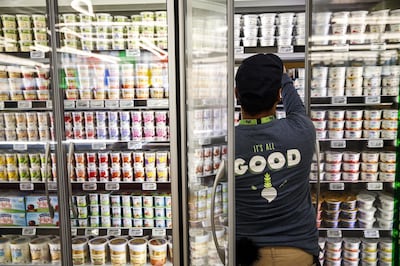Sucrose, fructose, dextrose, lactose, maltodextrin, glucose, oligofructose, corn syrup … the list goes on. If you're searching for sugar among the ingredients of your favourite foods, it can hide behind as many as 60 different names. And if that wasn't taxing enough, as you stagger along the supermarket aisles, you will need even more advanced powers of deduction to understand the labelling on nutritional information.
Take that childhood favourite, yoghurt, for example. Be it fruity, plain, Greek, Icelandic, soya, coconut, strained, organic or pro-biotic, there are so many brands and varieties that you could spend hours comparing food labels to find the brands that contain the least sugar.
Quite how much of it is added to yoghurts marketed as being suitable for children shocked Dr Bernadette Moore, an associate professor at the University of Leeds’ school of food science and nutrition. She decided to embark on a research project with her students after reading the United Kingdom government’s industry guidelines on sugar reduction that aims to see 200,000 tonnes of sugar removed from British supermarket shelves by 2020, by targeting breakfast cereals, biscuits, cakes, confectionery, ice creams and lollies, morning goods such as croissants, puddings and sweet spreads. Eight out of the nine items on the list made sense to Moore. But then there was yoghurt.
Read more: Sugar-free alternatives don’t mean missing out: recipes to try
"I have the cutest picture of my daughter at nine months old with fromage frais smeared all over her face," she recalls. "She loved those things. I discovered that they were about 60 per cent sugar at the time – they have come down – and I just went: 'Holy moly.'
“I was mashing up food and doing the things that I was supposed to do, and then I’d give my daughter the yoghurt. What I didn’t know was that I was training her sweet taste buds, and she loved it because it was the one sweet thing I was giving her, other than fruit.”
The danger with sugar
It's the not knowing that riles Moore, who describes herself as a "nerdy" molecular biologist, whose research findings on yoghurt made headlines around the world. Her objection is not necessarily that there is sugar added to yoghurt, just that it is difficult for consumers to determine just how much is present in processed foods.

For a child younger than four, a processed yoghurt can contain as much as 25 per cent of the recommended daily sugar intake. So as a parent, especially one with a new baby, Moore reasons that you’re far better off serving your child natural full-fat yoghurt with whole fruit mashed into it. Whole fruits contain fibre that helps the body absorb the sugar and it’s good for a healthy gut.
“Yes, you’ll get some sugar but don’t worry about it,” she says. “There isn’t anybody in any country who eats so much fruit that they need to be concerned about it from a sugar point of view.”
Speaking to Moore about a subject as complex as food labelling and nutrition is a joy – she combines specialist knowledge based on scientific research with the common-sense approach of a parent who knows kids can be tricky eaters. “Sugar isn’t bad if you have an active child, a healthy diet and an active lifestyle,” she says. But the problem is, “Most of us don’t.”
At her home in Yorkshire, Moore sweetens natural yoghurt with homemade jam. “I know it’s sugar,” she says, “but if you put in a teaspoon [of jam] and you know you’ve put in a teaspoon, that’s different from eating a product that has three teaspoons that the manufacturer put in there that you didn’t know about.”
_______________________
Read more:
The right light bites for your little ones
How to talk to kids about healthy eating
Beat summer boredom: Chia seed slime, pasta painting, salt dough and other crafts
_______________________
Importance of healthy childhood eating habits
Beyond the breakfast table, what really concerns Moore is that children learn healthy eating habits that will stand them in good stead for the rest of their lives. She counsels parents to eliminate the big culprits that contribute the most sugars and calories to children older than seven – fruit juice and sodas – and to reduce their intake of cakes, biscuits and sweets. Keep desserts and puddings to an occasional treat, rather than a daily one, she says. And if you have a sweet tooth, have a few squares of dark chocolate with more than 80 per cent cocoa, with nuts in it, which contains less sugar than a bar of milk chocolate laced with caramel.

“The concern is, once you’ve taught children to love sugar, high fat and high salt, that is very difficult to unlearn,” she says. “That’s why the childhood part is really important.”
Hers is a sensible public-health message about cooking and eating healthy, filling meals made from whole foods, fruit, vegetables, grains and fats in moderation. There's nothing new or revelatory here – it won't launch a YouTube channel or a lifestyle craze, and it's not only within reach for the well-off. Quite the opposite: old-fashioned, home cooking like your grandparents enjoyed is cheaper than buying ready made, processed meals. What's lacking today perhaps, is some basic cooking skills – and the time to shop and cook from scratch, as our working lives spill out of the office and into our homes. But as the next generation get fatter, it's increasingly clear to parents everywhere that action is needed.






